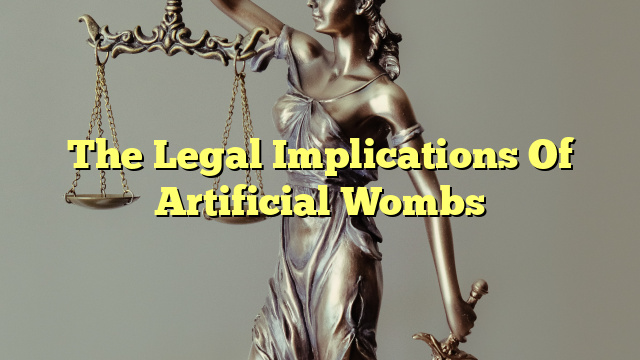Table of Contents
- Introduction
- Legal Implications of Artificial Wombs
- Positive Implications of Artificial Wombs
- Conclusion
Introduction
The world is slowly becoming more and more technology-driven. As a result, the field of medicine is no longer limited to traditional treatments and procedures. Instead, it is slowly expanding its boundaries to incorporate new technologies and treatments. One of the most radical and far-reaching advancements in modern medicine has been the development of artificial wombs. Artificial wombs, also known as ectogenesis, are artificial systems that are designed to create an environment in which a fetus can develop. They are considered to be a revolutionary development in obstetrics and gynecology, as they offer a potential solution to a variety of medical problems, including infertility and preterm labor. However, the legal implications of artificial wombs must be considered before they are put into widespread use. This paper will discuss the legal implications of artificial wombs, with a focus on the legal and ethical questions surrounding their use.
Legal Implications of Artificial Wombs
Law of Artificial Wombs
The legal implications of artificial wombs are complex. In the United States, the law does not currently recognize the existence of artificial wombs, as the technology is still in its infancy. As such, there is no legal framework that specifically addresses the legality of their use. However, the law does recognize the concept of gestational surrogacy, in which a woman carries a baby for another person. In this case, the surrogate is the legal mother of the child, and the person who contracted her services is the legal father. This same legal framework could potentially apply to the use of artificial wombs, as the surrogate would still be the legal mother of the child.
Ethical Questions Surrounding Artificial Wombs
Despite the potential legal implications of artificial wombs, there are also ethical considerations to be taken into account. For instance, it is important to consider the ethical implications of creating and using artificial wombs for the purpose of surrogate pregnancy. While the technology could potentially be used to provide fertility options for those who would otherwise be unable to conceive, it could also be used to exploit women and put them into situations that could be emotionally and psychologically damaging. Additionally, it could be seen as a violation of the rights of the child, as they would be completely removed from the natural process of gestation and childbirth.
Positive Implications of Artificial Wombs
Despite the ethical and legal implications of artificial wombs, there are also a number of potential benefits associated with their use. For instance, the technology could potentially be used to provide medical treatments for preterm babies, who are often unable to survive the natural process of childbirth. Additionally, it could also be used to increase the chances of survival for babies born with severe medical conditions, such as congenital heart defects. Finally, it could also be used to allow women who are unable to carry a pregnancy to experience the joys of childbirth.
Conclusion
The legal implications of artificial wombs are complex and far-reaching. While the technology could potentially be used to provide fertility options and medical treatments, there are also ethical and legal considerations to be taken into account. Additionally, there are a number of potential benefits associated with the use of artificial wombs, including the potential to increase the survival rate of preterm babies and to allow women who are unable to carry a pregnancy to experience the joys of childbirth. Ultimately, the legal implications of artificial wombs must be carefully considered before they are put into widespread use.

